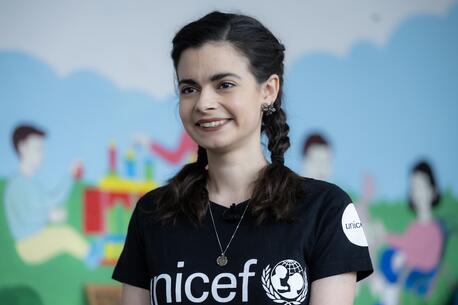Improving the Lives of Children in Jamaica
Many of us see Jamaica as an island paradise, the birthplace of Reggae music, and home to world class athletes. But Jamaica is not perfect: The country is home to one of the world’s greatest wealth disparities and has one of the highest homicide rates. These harsh realities create a difficult environment for children. I recently had the privilege of hearing UNICEF Jamaica Representative Robert Fuderich speak about UNICEF’s programs in Jamaica, and attending this event further deepened my appreciation for UNICEF’s work.
 A boy plays at the UNICEF-supported Denham Town Basic School in Jamaica. © UNICEF/NYHQ2008-0292/Susan Markisz
A boy plays at the UNICEF-supported Denham Town Basic School in Jamaica. © UNICEF/NYHQ2008-0292/Susan Markisz
Hayoung Kyeis a Program and Strategic Partnerships intern at the U.S. Fund for UNICEF. Many of us see Jamaica as an island paradise, the birthplace of Reggae music, and home to champion athletes. But Jamaica is not perfect: The country has one of the world’s greatest wealth disparities and one of the highest homicide rates. These harsh realities create a difficult environment for children. UNICEF is there on the ground, helping Jamaica’s children not only survive, but develop their full potential. On January 28, I had the privilege of hearing UNICEF Jamaica Representative Robert Fuderich speak about UNICEF’s programs in Jamaica. Attending this event further deepened my appreciation for UNICEF’s work, as I learned how its programs are making a positive impact on these children’s lives. UNICEF’s work in Jamaica centers on three major programs: Adolescent Health and Empowerment, Quality Education, and Child Protection. Some examples of UNICEF’s work that I found particularly outstanding are:
- UNICEF’s program on adolescent health and empowerment, which has created services for adolescents dealing with substance abuse, mental health challenges and sexual/reproductive issues. Jamaican adolescents face a risk of contracting HIV; therefore UNICEF supports adolescent-friendly health services to meet young people’s particular needs.
- The establishment of early childhood interventions and child-friendly schools, to promote children’s learning from an early age. Mr. Fuderich shared that although Jamaican children's access to primary school is fairly high at 99.7%, the educational achievements are relatively low. For example, in fourth grade, 70% of students passed the literacy test, and 45% passed the numeracy test. Therefore, UNICEF’s focus is to motivate children to learn, in an effort to increase their overall achievement rates.
- The improvement of advocacy services for child victims of abuse and violence, especially those who come into conflict with the law. Juvenile detention centers do not exist in Jamaica, and the government of Jamaica has faced some fiscal challenges in implementing social policies such as the Child Care and Protection Act of 2004. The result is that children are being placed in adult prisons for arbitrary convictions, often returning to society later as hardened criminals.
UNICEF’s work in Jamaica has made positive changes in children’s lives. Successes include newborns now having a 97% chance of surviving beyond age five, and school enrollment up to the secondary level approaching 100%. Hearing about these accomplishments once again underscored for me the effectiveness of UNICEF’s approach, and its expertise in developing strategies and programs to meet the needs of children despite some incredible challenges. I am filled with hope for Jamaica's children. If you would like to learn more about the current situation and the programs for children in Jamaica, please visit UNICEF’s Jamaica page. To support UNICEF's work on behalf of children, visit our donation page.


